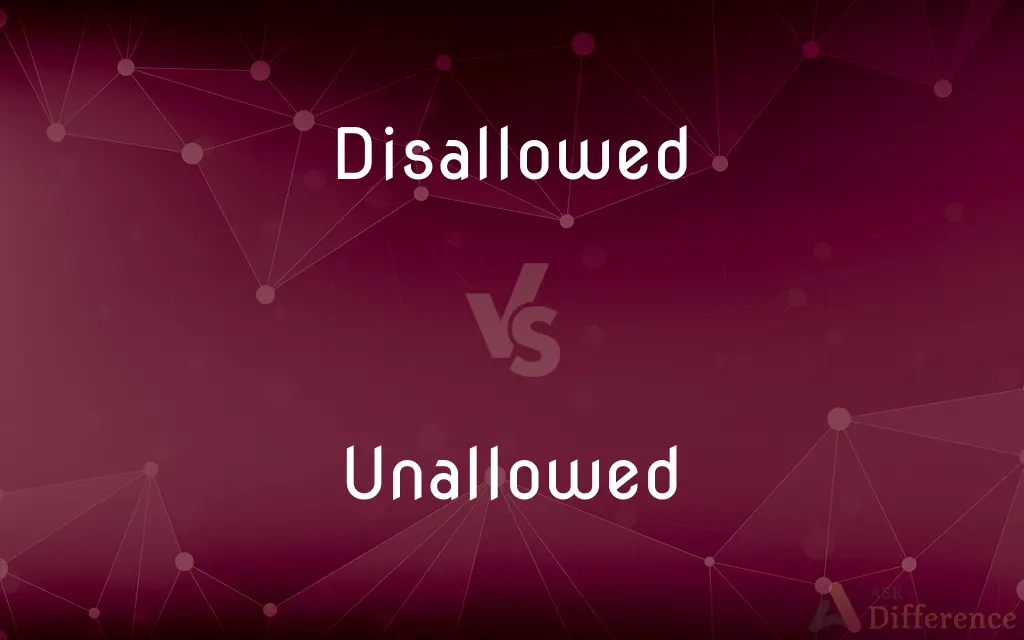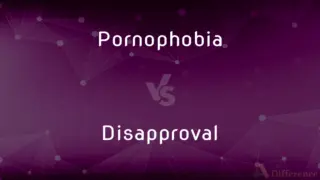Disallowed vs. Unallowed — What's the Difference?
By Fiza Rafique & Maham Liaqat — Updated on March 18, 2024
Disallowed refers to something explicitly forbidden or not permitted by rules or authority, whereas unallowed isn't a standard term and is rarely used.

Difference Between Disallowed and Unallowed
Table of Contents
ADVERTISEMENT
Key Differences
Disallowed involves actions or items explicitly forbidden by a set of rules or an authority figure, indicating that it was once considered but has been officially rejected or banned. For example, in sports, a disallowed goal is one that has been nullified by the referee due to a violation of the game's rules. Unallowed, although not commonly used in formal English, implies something that has not been permitted, but lacks the formal or official connotation of being explicitly rejected or banned. It's more about the absence of permission rather than an active prohibition.
Disallowed carries a sense of authority and official decision-making. It's often used in legal, regulatory, and sports contexts where rules are clearly defined and enforced. On the other hand, unallowed, due to its rarity and less formal nature, might be used in more casual or less structured contexts.
The term disallowed signals that something was considered and then formally rejected or prohibited. While unallowed suggests something is not permitted without implying a formal decision process.
While disallowed is universally understood and widely used in formal contexts, unallowed's use is much less frequent, and it might be considered incorrect or informal in many situations. The choice between these terms depends largely on the formality of the context and the clarity of the prohibition involved.
Comparison Chart
Definition
Explicitly forbidden by rules or an authority.
Not permitted, but without the formal prohibition.
ADVERTISEMENT
Usage Context
Legal, sports, formal settings.
Rare, less formal contexts.
Connotation
Authority and official decision.
Absence of permission without explicit rejection.
Formality
Formal and widely accepted.
Considered informal or incorrect.
Example
A disallowed goal in football.
*Rarely used in standard English contexts.
Compare with Definitions
Disallowed
Prohibited by authority.
The use of mobile phones is disallowed during examinations to prevent cheating.
Unallowed
Absence of explicit authorization.
Unallowed software installations are a breach of IT policy. (Informal usage)
Disallowed
To refuse to allow or accept.
The committee disallowed the proposal due to ethical concerns.
Unallowed
Not permitted, informal usage.
Unallowed entry into the building creates security risks. (Note. Usage is rare and not standard)
Disallowed
To declare invalid.
The judge disallowed the evidence due to its improper acquisition.
Unallowed
Without formal prohibition.
Parking here is unallowed, though not specifically signed. (Informal and rare)
Disallowed
Rejected according to rules.
The runner's last move was disallowed because it violated the competition rules.
Unallowed
Lacking official permission.
Unallowed use of the facility could lead to penalties. (Non-standard usage)
Disallowed
To make impossible.
The design of the system disallows any unauthorized access.
Unallowed
Not granted acceptance.
Unallowed visitors must remain outside the premises. (Non-standard)
Disallowed
To refuse to allow
"[The government] disallowed his aging and dying parents any reunion with their only child" (John Simon).
Unallowed
Not allowed; forbidden.
Disallowed
To reject as invalid, untrue, or improper.
Disallowed
Forbidden
Disallowed
Invalid
Disallowed
Simple past tense and past participle of disallow
Common Curiosities
What does disallowed mean?
Disallowed refers to something explicitly forbidden or not permitted by rules or an authority.
Is unallowed a real word?
Unallowed is not commonly used in formal English and is often considered non-standard or incorrect.
What's the difference between disallowed and unallowed?
Disallowed is formally and specifically used to denote prohibition, whereas unallowed is rarely used and lacks formal acceptance.
How do you use disallowed in a sentence?
"The referee disallowed the goal after reviewing the play for offside."
Why is unallowed not widely used?
It's considered non-standard and informal, making it less preferable in formal writing and speech.
Can something be unallowed in a legal context?
Typically, the term "disallowed" is preferred in legal contexts due to its specificity and formality.
Can disallowed items become allowed again?
Yes, if the rules or decisions that led to the disallowance change.
Can unallowed be used in formal documents?
It's not recommended due to its informal nature and lack of standardization.
Is disallowed only used in sports?
No, disallowed is used in various contexts, including legal, regulatory, and formal settings.
Is there a legal implication for disallowing something?
Yes, disallowing something can have legal implications, especially in regulatory or compliance contexts.
How does the concept of disallowance apply in digital security?
Certain actions, like unauthorized access, are disallowed to protect digital assets.
Can cultural differences affect what is considered unallowed?
Yes, cultural norms can impact perceptions of what is informally unallowed or frowned upon.
What's an example of a disallowed expense in finance?
A personal purchase made with a company credit card can be disallowed for reimbursement.
How do societal norms influence what is disallowed?
Societal norms can shape laws and regulations, thus influencing what is formally disallowed.
Is it common for terms to be both disallowed and unallowed?
Typically, the term disallowed is used for clarity and specificity, making the dual usage rare and context-dependent.
Share Your Discovery

Previous Comparison
Chattering vs. Chatting
Next Comparison
Pornophobia vs. DisapprovalAuthor Spotlight
Written by
Fiza RafiqueFiza Rafique is a skilled content writer at AskDifference.com, where she meticulously refines and enhances written pieces. Drawing from her vast editorial expertise, Fiza ensures clarity, accuracy, and precision in every article. Passionate about language, she continually seeks to elevate the quality of content for readers worldwide.
Co-written by
Maham Liaqat















































